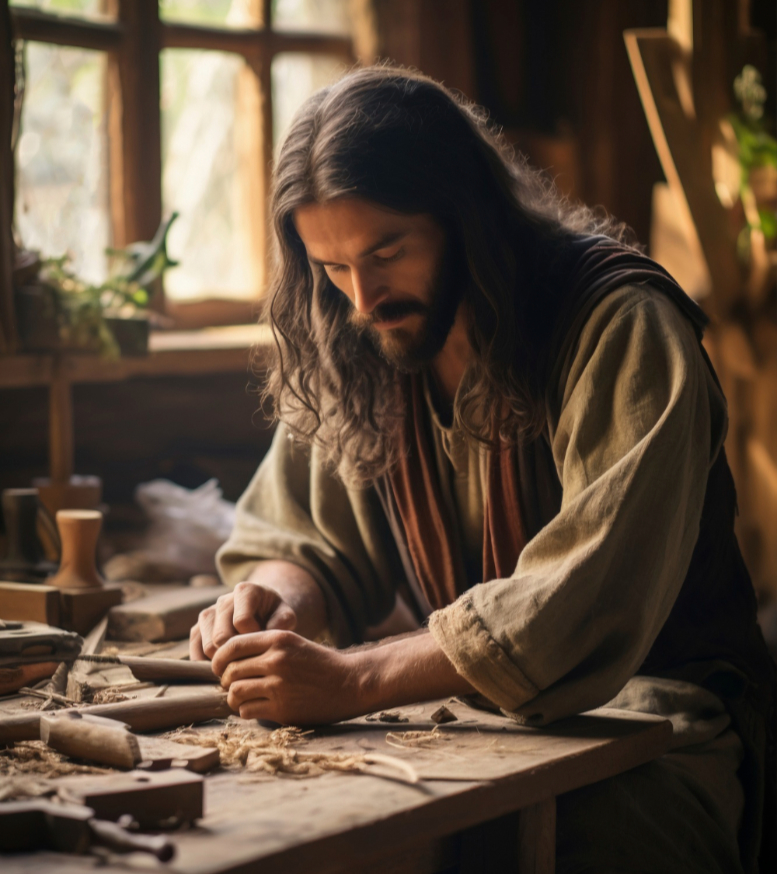In the last year or two, there has been an issue that I have been aware of, but have not really addressed much. Recently, I have had some interesting discussions surrounding the balance of God's grace, in light of passages on works. In this article, I want to address this subject.
Now, I know we have been taught that no work is required. This belief is founded on this passage:
"For it is by grace you have been saved through faith, and this not from yourselves; it is the gift of God, not by works, so that no one can boast. For we are God’s workmanship, created in Christ Jesus to do good works, which God prepared in advance as our way of life" (Eph. 2:8-10).

Yet, this passage simply doesn't mean what people think it means.
Let's look at the verse again, but I'm going break it apart and accent some key aspects:
8 "For by grace you have been saved THROUGH FAITH, and that not of yourselves; it is the gift of God,"
9 "not of works, lest anyone should boast."
10 "FOR WE ARE HIS WORKMANSHIP, created in Christ Jesus FOR GOOD WORKS, which God prepared beforehand that we should walk in them."
So, this very verse that people quote to mean that works are not required, also points to the connection of faith and works. Let's look closer at the connections we can infer from the passage.
Salvation is THROUGH FAITH… If you don’t have works, you don’t have faith, because your faith is dependent on your works. So, therefore the faith would be dead. If you don’t have faith, by what faith are you saved?
Keep in mind that "through faith" doesn’t simply mean “belief,” like we think of it these days. Faith, by biblical definition, requires action.
For belief in God is so much more than we make it out to be. Even the devil believes, but we must believe “unto salvation” (Greek text analysis).
This signals a change in behavior, from glory to glory (2 Cor. 3:18), not merely a change of mind, as some preach.

Next, Ephesians 2 says, “…not of works, lest anyone should boast. FOR [because] WE ARE HIS WORKMANSHIP, created in Christ Jesus FOR GOOD WORKS…”
Note the word "for," which can be swapped out with "because," without losing any meaning. This means that the latter part of the verse is a direct effect of the preceding cause. We can reverse the logic flow of the argument and it would look like this:
"We are His workmanship, created in Christ Jesus for good works, therefore salvation is not of our own works, lest anyone should boast."
When we reverse that logical flow, the passage becomes easier to understand as it was meant, which is that our salvation is not of our own works, because we are his workmanship (back to the original logic flow).
So then, this effectively means that we can’t even claim full credit for the works we do, because it flows out of the workmanship of Christ. His workmanship is the reason for our works, and our works could not be complete without that.
To parallel that back to the analogy of the guy lost at sea, God made the man. He made him with giftings and He made him with purpose. His strength to row (or even swim) to shore and his very life were gifts from God, which flowed out of His workmanship. His faith and diligence are also a gift from God.
So, works are required for the very faith we need for salvation. Even so, the works do not save us. This is a very important distinction.
Don't misunderstand me. There’s nothing we could ever do to be saved. Even if our works were more than any mere mortal in history, we would still be unable to save ourselves.
Yet, works alone not being enough to earn salvation, is not synonymous with saying works are not required.
Eph. 2:8-9 is pointing to the first, not the latter. Let's look at why.
The emphasis in the Ephesians passage should be on the word “believe.”
What Is Belief?
If Noah “said” he believed, but didn’t build the ark, did he really believe?
So, if we truly believe that God raised Christ from the dead, then our declaration is not in word only, but also by how we become passionate for the great commission and His purpose for our lives.
Belief itself is not merely a mental exercise. It requires a response, or that belief is merely a philosophy that one has not yet aligned themself to. Re-read that.
God gave me a visual of this grace and works issue. Consider a man lost at sea and God sends to him a boat adrift. Then, the man climbs aboard and paddles to shore. Who saved the man? Did God save him, or did he save himself?
See, by God’s grace he received the boat, but by his works he made it to shore. God saved him, but his works flowed out of that. His works are a byproduct of grace. So, it’s by God’s grace he was able to complete the works.
Such it is with salvation. Without salvation, the works would not be completed. Without faith, it is impossible to please God (Heb. 11:6). Therefore, faith precedes the works, which are made possible by the faith.
The Bible says that faith without works is dead. So, if you don’t have works, you don’t have faith; and if you don’t have faith, you can’t be saved.

In the metaphor, Christ gave him the boat, or better yet, Christ is the boat! The man must believe that the Boat can get him to shore! Yet, he must row, to prove his faith. By proving his faith, his salvation becomes manifest.
That’s scriptural yo!
Faith is not faith without action. It is through our faith, with action, that we are are saved. Even so, our faith with action is useless without Christ's sacrifice.
Therein is the very point I am making! If we could do everything right, we would still not be justified, because of our sinful nature. So, even though we paddle to shore, Christ's sacrifice made it possible. Therefore, even still, no man can boast!
So, at the risk of being slightly redundant, let's look at it in other words. Even though works are a necessary part of our walk and salvation, it's still not because of our works, because the equation doesn't equal salvation without Christ's work on the cross.
Our faith does not merely mean believing with our minds. It means to believe so much that we actually act on our beliefs.
Otherwise, it isn't belief. Therefore, it is actually unbelief. This is why we are given the Parable of the Talents.
If a person has no works, both belief/faith and works are removed from the equation, which leaves the person unsaved.
I remember when I was about 17. I loved reading Proverbs and found everything so interesting. Around that time, God gave me a few logic flows, diagrams, of how different situations worked.
For years, I didn't do many of these, until the last couple of years.
This is a logic flow God gave me, concerning the balance of faith and works:
Let's look at the scripture for these aspects.
The Bible produces faith (faith comes by hearing, hearing by the word of God, Rom. 10:17).
Faith causes belief and action, of which Hebrews 11 shows multiple examples.
Faith without works is dead (Js. 2:26). So, logically works substantiate one's faith. ...and it's back to faith again!
People argue, "but, we're saved by grace alone!" No, we're saved by grace, through faith. Active faith includes works, or the faith is dead. Therefore, the biblical definition of faith includes works. It's baked right into real faith.
Think of our initial work of belief like the starting of a car, where the starter gives fire to the spark plugs.
God's Spirit is the starter, because He calls us, and our faith is the plugs.
If the plugs are not working, we have everything we need to have faith, but the faith doesn't work.
If we don't have works, we have faith, or dead plugs.
When God fixes our plugs and believe, our spiritual car starts and our journey toward God begins. However, we still need ongoing fire, which is why we have the warning of the lukewarm church in Revelations (Rev. 3:14-22).
The gas is the Holy Spirit, which tells us what works we are to burn through, bringing power and hope to our lives in Christ (Rom. 15:13).
So, our continual works fuel our faith in an ongoing basis.
It seems that most people have a lofty idea of what a work MUST be. While these lofty things CAN be works, simpler things can also be works.
I've had posed the argument, "what about the guy on the cross, next to Jesus?"

My answer to that is, he did everything he could. That’s actually the point.
The thief's only work was to believe on Jesus. This is every Christian's first, and most important work.
However, this is where many Christians believe the works may be permissibly halted, but the works don't stop there, without risking the quality of our faith. We eat meat, we grow spiritually, and God calls us to other works. From our belief in God, we do His work. In this, our faith is substantiated, because we are then walking in our purpose.
Perhaps a second work is to get baptized. Or, to be a witness....or, to bring a meal to someone.
So, for the seasoned Christian, works would look very different from the guy on the cross next to Jesus.
While this may seem daunting, consider this question:
Will God give you the grace to do His work? If you answered no, then check your faith, because His Word says He prepared those works beforehand, that we may walk in them (Eph. 2:10). Plus, He also said that he would not put any temptation above that which you are able to bear…that includes the temptation to pull a Jonah and run from your calling.
The Bible says, we "have been" saved (2 Tim. 1:9), are "being" saved (1 Cor. 1:18), and "will be" saved (Rom. 5:9-10).
Therefore, it is necessary for our faith to be active/valid throughout our lives, at least onward from conversion.
It's in this light that we need to approach our faith and works.
If our faith is dead, because of our works, then our faith is of no effect any longer. Then, by what are we "being" saved?
So, in the beginning, a work is believing in Christ. After that, our works are to be increasingly geared around what the Holy Spirit is telling us to do.
It really comes down to whether or not we are following Christ. If we are, then the Spirit will guide us into truth and reveal to us our call.
Your works are your calling. As the verse says, we are His workmanship, created in Christ Jesus for good works, which God prepared beforehand that we should walk in them.
Is this not the very definition of God's calling?
Think of these works like stepping stones to salvation, by His grace.
God Bless!
–JCF
